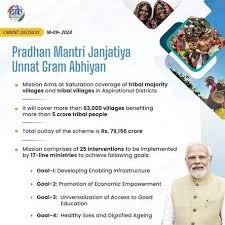Pradhan Mantri Janjatiya Unnat Gram Abhiyan: Empowering Tribal Communities
Introduction to the Scheme
The Pradhan Mantri Janjatiya Unnat Gram Abhiyan (PM-JUGA) is a groundbreaking initiative launched by the Government of India aimed at enhancing the quality of life and socio-economic conditions of tribal communities across the nation. This scheme, which reflects the government’s commitment to inclusive growth, focuses on the holistic development of tribal villages by providing essential services and infrastructure.
Objectives of PM-JUGA
The primary objective of PM-JUGA is to promote sustainable livelihoods for tribal populations by integrating various development initiatives. The scheme emphasizes self-sufficiency through skill development, promoting local entrepreneurship, and ensuring access to necessary services such as education and healthcare. By fostering a sense of community ownership, the initiative aims to empower tribal populations to take charge of their development.
Key Features of the Scheme
The PM-JUGA encompasses several critical features that set it apart from previous initiatives. Firstly, it adopts a multi-sectoral approach, integrating agriculture, health, education, and skill development into a cohesive framework. Secondly, it encourages collaboration between government agencies, NGOs, and local communities to ensure that the benefits reach the intended recipients effectively. Moreover, the scheme utilizes technology to monitor progress and enhance service delivery, thereby ensuring transparency and accountability.
Implementation Strategy
To implement PM-JUGA successfully, the government has devised a robust strategy that involves identifying tribal villages and assessing their specific needs. Local self-governance bodies, including Panchayati Raj institutions, play a pivotal role in the implementation process, ensuring community participation. Regular training and capacity-building programs will equip local leaders with the skills necessary to manage the scheme effectively.

Why This News is Important
Significance for Tribal Communities
The launch of PM-JUGA is a significant milestone in addressing the long-standing socio-economic challenges faced by tribal communities in India. Historically marginalized, these communities often struggle with access to basic services and economic opportunities. This scheme aims to uplift these populations by providing them with the tools and resources needed to thrive.
Alignment with National Goals
PM-JUGA aligns with India’s broader development goals, including the Sustainable Development Goals (SDGs) set by the United Nations. By focusing on poverty alleviation, gender equality, and quality education, the initiative contributes to national efforts to build an equitable society.
A Step Towards Empowerment
This initiative is not merely about service provision; it represents a paradigm shift towards empowering tribal communities. By fostering entrepreneurship and self-reliance, the scheme encourages tribal populations to become active participants in their development journey, which is crucial for sustainable progress.
Historical Context
Historically, tribal communities in India have been marginalized and excluded from mainstream development processes. Various government programs have attempted to address these disparities, yet many challenges persist, such as inadequate infrastructure, limited access to healthcare, and educational inequalities. The launch of PM-JUGA represents a renewed commitment to rectifying these historical injustices by focusing on an integrated development model that recognizes the unique needs and potential of tribal populations.
Key Takeaways from PM-JUGA
| Serial Number | Key Takeaway |
|---|---|
| 1 | PM-JUGA aims to enhance the quality of life of tribal communities. |
| 2 | The scheme adopts a multi-sectoral approach integrating various development sectors. |
| 3 | It encourages collaboration between government, NGOs, and local communities. |
| 4 | Local self-governance bodies play a crucial role in the implementation of the scheme. |
| 5 | PM-JUGA aligns with India’s national goals and the Sustainable Development Goals (SDGs). |
Important FAQs for Students from this News
Q1: What is the Pradhan Mantri Janjatiya Unnat Gram Abhiyan (PM-JUGA)?
A1: PM-JUGA is a government initiative aimed at improving the socio-economic conditions of tribal communities in India through integrated development.
Q2: What are the key objectives of PM-JUGA?
A2: The scheme focuses on promoting sustainable livelihoods, enhancing access to essential services, and empowering tribal populations through skill development and local entrepreneurship.
Q3: How does PM-JUGA ensure community participation?
A3: The scheme emphasizes collaboration with local self-governance bodies and encourages community ownership in the planning and implementation processes.
Q4: Why is PM-JUGA significant for India?
A4: It addresses historical inequalities faced by tribal communities and aligns with national goals for poverty alleviation and sustainable development.
Q5: What sectors does PM-JUGA integrate for development?
A5: The scheme adopts a multi-sectoral approach, integrating agriculture, health, education, and skill development.
Some Important Current Affairs Links


















 Exciting News!
Exciting News!  Join Our Telegram Channel Now!
Join Our Telegram Channel Now!
 Join our Telegram channel for a thrilling adventure into the world of daily current affairs.
Join our Telegram channel for a thrilling adventure into the world of daily current affairs. 
 Don’t miss out on the latest updates and insights! Click to join now and be part of the knowledge revolution!
Don’t miss out on the latest updates and insights! Click to join now and be part of the knowledge revolution! 
